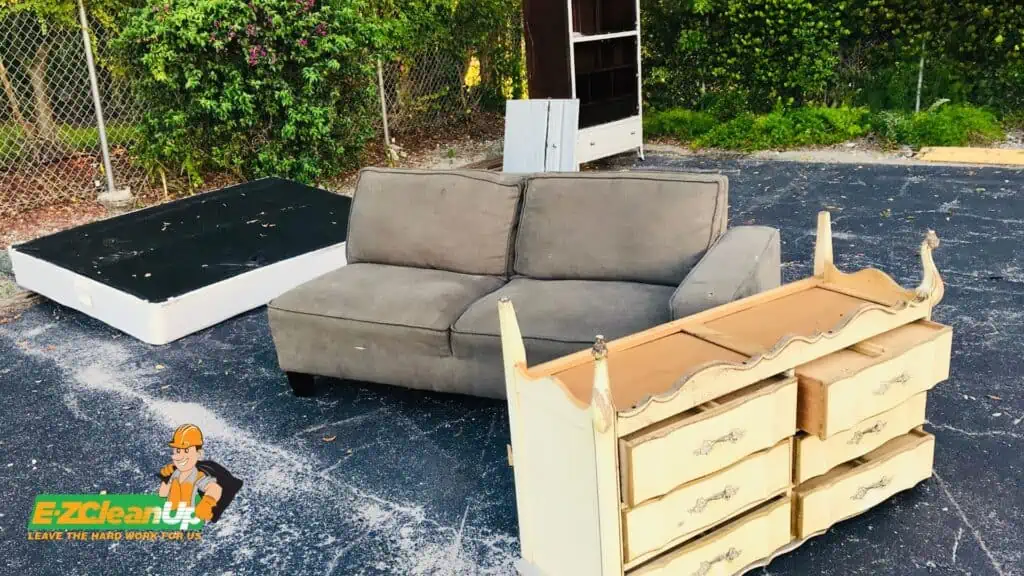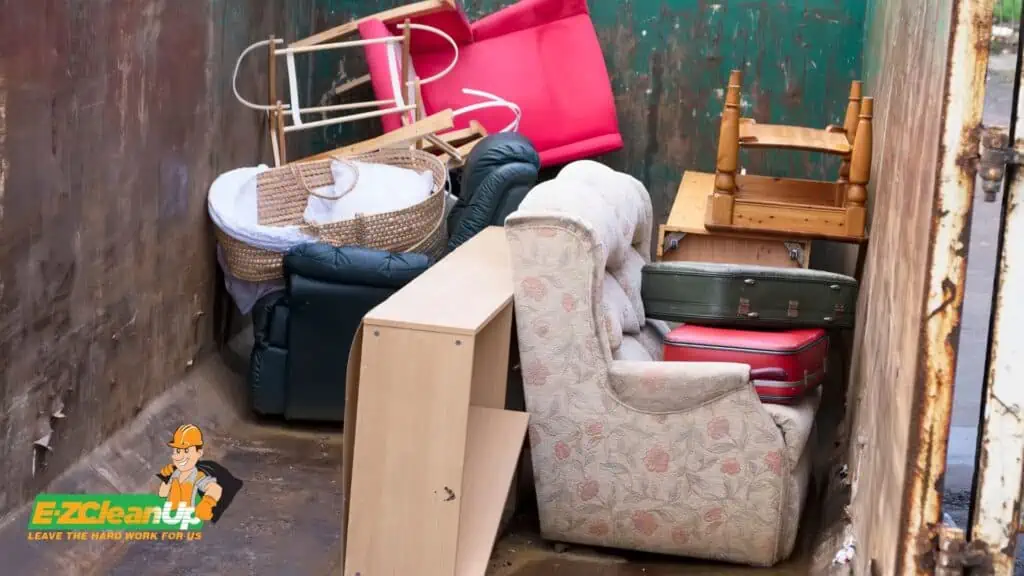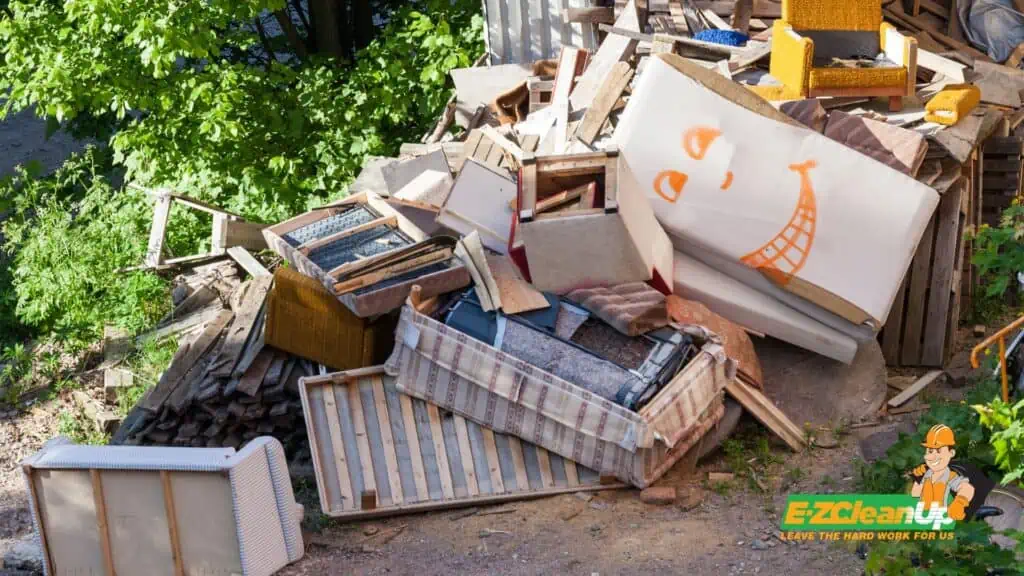To discard old furniture, consider local waste policies, use private junk removal services, or engage in furniture recycling programs. These eco-friendly methods ensure responsible disposal.
For a comprehensive guide and in-depth answers to “How can I throw away my old furniture,” continue reading our detailed article below.
Options for Disposing of Old Furniture
When disposing of old furniture, it’s essential to consider local waste management policies, utilize private disposal services when more convenient or appropriate, and take advantage of specialized furniture recycling programs to ensure an eco-friendly approach.
Each option has its own set of benefits and considerations, which include the following:

Local Waste Management Policies
Local waste management policies vary widely, depending on your location. Many cities have specific ordinances and programs for waste disposal and recycling. For instance, certain local policies might include bans on disposing of certain materials or mandatory recycling requirements.
These regulations can include mandatory separation of organic material from trash, as well as specific rules for commercial and residential waste disposal. It’s crucial to be aware of and comply with these local regulations to avoid legal issues and ensure environmentally friendly disposal practices.
Private Furniture Disposal Services
Private disposal services offer an alternative to municipal waste management. These services can include junk removal companies like us at EZ CleanUp or specialized furniture disposal services. At EZ CleanUp, we provide more flexible pickup schedules and can handle a wider range of items, including furniture that may not be accepted by local waste management.

Specialized Furniture Recycling Programs
Furniture recycling programs are an excellent way to ensure your old furniture doesn’t end up in a landfill. Local governments, non-profits, or private companies can run these programs.
They involve the disassembly and sorting of furniture to recycle materials like wood, metal, and fabric. Recycled furniture materials can be used to create new products, thus conserving resources and reducing the need for new raw materials.
Preparing Furniture for Disposal
When preparing large furniture for disposal, it’s important to assess which pieces need to be disassembled. This includes sofa beds, wardrobes, and tables with extensions. Removing doors from their hinges can provide extra space for moving large items through doorways.
You will also need to prepare the following tools for dismantling:
- Pliers
- Screwdrivers
- Hammers
- Staple removers
- A circular saw (if necessary)
Here are the steps to follow in dismantling furniture, depending on its type:
- Start by removing easily detachable parts such as doors or drawers.
- For items like wardrobes, begin by removing doors, then shelves, rails, and finally, the main structure.
- With sofas, consider the option of sawing them into smaller pieces if disassembly isn’t practical.
- If dealing with glued joints, drilling holes and applying a solvent can help loosen the adhesive.
Identifying Recyclable and Non-recyclable Parts
Not all parts of furniture can be recycled. Treated wood, certain glued materials, and leather often cannot be processed through standard recycling channels. However, metal components, some plastics, and untreated wood can usually be recycled. It’s essential to separate these materials before disposal.
For instance, metal frames from beds or cabinets can be taken to a scrap yard. Foam cushion materials, particularly those made with chemicals or glues, might not be accepted for recycling. It’s important to check with local recycling facilities to understand what materials they accept.
Safe Handling and Transportation Guidelines
When moving furniture for disposal, clear any obstacles from your path and wear appropriate footwear for safety. If the furniture is heavy or awkward, get help or use tools like dollies and sliders.
When lifting, keep your back straight and bend your knees. If the furniture is particularly bulky or heavy, breaking it into smaller pieces can make it easier to handle and more space-efficient in a dumpster. Remember to load dumpsters properly while keeping all items below the top rail and adhering to weight limits to avoid additional charges.
Eco-friendly Disposal Methods of Old Furniture
Here are some ideas to ensure you dispose of your old furniture in environment-friendly ways:
Upcycling and Repurposing Ideas
Upcycling and repurposing old furniture can be a creative and environmentally friendly way to give new life to pieces that might otherwise be discarded. Numerous innovative ideas exist for transforming old furniture into functional and stylish items.
For example, old chairs can be repurposed into French-style benches, drink stands, or dog bowl chairs. Dressers can be turned into TV stands or kitchen islands, and headboards can be converted into chalkboard coat racks or even stylish benches for a garden setting.
Additionally, sewing tables can be transformed into desks, and old window frames can be repurposed into coffee tables. These repurposing projects not only reduce waste but also add a personal touch to your home decor.

Donating to Charities and Non-profits
Donating old furniture to charities and non-profit organizations is a great way to dispose of it responsibly. Many organizations accept furniture donations and resell them at low prices to help those in need. Larger organizations often have drop-off locations or offer pickup services.
When donating, ensure the furniture is in usable condition, as donating items in poor condition can create a burden for the charity. Examples of organizations that accept furniture donations include Habitat for Humanity ReStore, Goodwill, The Salvation Army, The Furniture Bank Association of North America, AMVETS National Service Foundation, and The Arc.
The Importance of Proper Furniture Disposal
The proper disposal of old furniture is not just an environmental concern but also a legal and financial one. Here is the list of why it’s important:
Environmental Protection
When furniture ends up in landfills, it can release harmful chemicals and pollutants, which can contaminate soil and water supplies. Additionally, furniture in landfills is a significant source of methane, a potent greenhouse gas that contributes to climate change.
Resource Conservation
Recycling old furniture helps conserve natural resources. Trees, which are often cut down to create new furniture, can be saved if we recycle more. It also requires less energy to recycle furniture than to manufacture new pieces.
Cost Savings
While buying new furniture can be costly, recycling and reusing old pieces can save money. Thrift stores, garage sales, or online marketplaces often offer high-quality furniture at a fraction of the price of new items.
Environmental Impact of Furniture Waste
Here are the negative effects of disposing of furniture improperly:
Landfill Space and Pollution
Furniture waste predominantly ends up in landfills, where it occupies significant space and contributes to environmental pollution. Sadly, up to 80% of furniture items are not recycled, which makes them some of the least recycled consumer goods.
Greenhouse Gas Emissions
The decomposition of organic waste, including furniture in landfills, releases methane. This gas significantly contributes to greenhouse gas emissions and worsens global warming and climate change.
Depletion of Resources
The production of new furniture often leads to the depletion of natural resources, including wood. This takes up valuable land space and uses fossil fuels when incinerated.

Legal Considerations in Furniture Disposal
It’s important to be aware of and comply with local waste disposal regulations. Different areas may have specific rules about how and where to dispose of old furniture, and failure to comply can result in fines or other legal consequences.
Some furniture contains hazardous materials, especially older pieces. It’s important to properly dispose of these materials to avoid legal issues and harm to the environment.
In some regions, recycling certain types of furniture, like those made of wood or metal, might be mandatory. This is part of broader efforts to reduce waste and promote environmental sustainability.

Cost Considerations in Furniture Disposal
The cost of furniture removal varies based on the method you choose. Hiring a junk removal service is a common option, where you can expect to pay anywhere from $75 to $500, depending on the amount and type of furniture.
The minimum fee for most junk removal companies ranges from $75 to $125, with costs increasing for larger amounts of furniture. For instance, removing a piano could cost around $310, while disposing of a sofa, bed frame, and mattress might cost about $225.
Renting a dumpster is another option, particularly useful for larger cleanout projects. The average cost for renting a 20-yard dumpster is around $472, with prices varying between $279 and $795, depending on your location and the rental company. This option allows you to load furniture at your own pace and is best for removing multiple items or large furniture.
Understanding Fees for Specialized Disposal Services
The fees for specialized disposal services depend on several factors, including your geographic location, the type and amount of furniture, and the accessibility of the furniture. The complexity of the job, such as needing to carry a sofa down multiple flights of stairs, can also influence the price. The quoted cost generally includes pickup, disposal, labor, fuel, and any applicable taxes.
Budget-friendly Disposal Options
For a more budget-friendly approach, you might consider DIY options like hauling furniture to a charity or landfill yourself, which can be free or cost around $50 or more, depending on fuel and landfill fees. Keep in mind the effort and time involved in this method. Some landfills charge between $10 to $30 per item or $32 to $40 per ton.
Alternatively, selling or donating your furniture is a cost-effective method. Online platforms like Craigslist or Facebook Marketplace can be used for selling, while local charities often welcome donations of furniture in good condition.

EZ CleanUp: Your Eco-Friendly Solution for Furniture Disposal
Disposing of old furniture can be a significant challenge, especially when considering the environment. This is where EZ CleanUp steps in.
We offer a sustainable and efficient solution for your furniture disposal needs in Philadelphia and surrounding areas. Our team specializes in removing unwanted items from your space and ensures a swift and hassle-free experience.
Beyond just junk removal, EZ CleanUp offers a comprehensive range of services, including dumpster rental, clearing-out assistance, and demolition projects. We can handle any scale of junk removal with a promise of a smooth and efficient process from start to finish.
Contact EZ CleanUp for a free on-site estimate and experience the ease of professional junk removal. Let us help you reclaim your space and contribute to a greener future.













